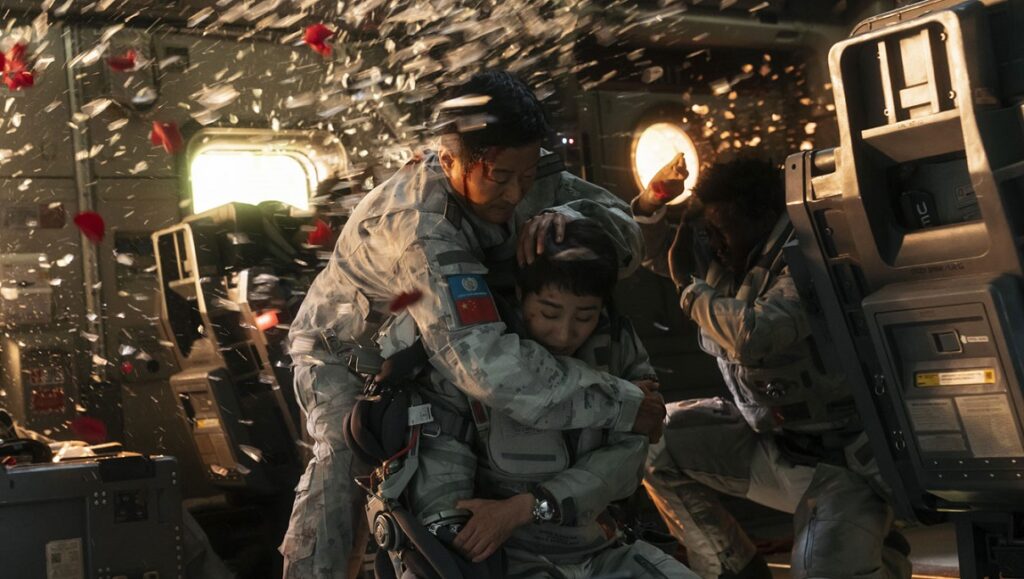An unexpectedly maverick prequel/sequel hybrid to one of the biggest mainland Chinese blockbusters of this century, The Wandering Earth II ditches the more rigid genre framework of its predecessor (probably in part because it doesn’t have Liu Cixin’s short story source material to work with) and instead parcels out its apocalyptic sci-fi tropes over the course of a decades-spanning mosaic narrative concerned with capturing the minutiae of social change and scientific progress. To Western audiences, the vignette-like structure and various escalating crises will probably most resemble a more self-serious — and, of course, staunchly nationalistic — riff on gargantuanly-scaled Roland Emmerich disaster films like The Day After Tomorrow, 2012, and Moonfall. But there’s another, domestic influence here that’s worth considering.
Toward the end of the last century in China, a new generation of filmmakers suddenly found themselves with more latitude to comment freely on the volatile events of their country’s recent history than was typically tolerated, and many responded with sweeping melodramas concerned less with sticking to screenplay convention than offering a survey of the times, albeit anchored to the personal experiences of a handful of characters who usually spanned several generational perspectives. This strain of Chinese cinema is sometimes referred to as the “historical passage film”’ and its early practitioners included fifth-generation luminaries Zhang Yimou (To Live), Tian Zhuangzhuang (The Blue Kite), and Chen Kaige (Farewell My Concubine). The trend never really went away, and in fact, has arguably become more mainstream: Feng Xiaogang’s 2010 blockbuster Aftershock framed its “historical passage” around a disaster movie, and, even more notably, perhaps the most influential filmmaker in China since Zhang Yimou, Jia Zhangke created the precedent for a “historical passage” sci-fi film by setting the final act of 2015’s Mountains May Depart a then-distant 20 years into the future.
Now, Frant Gwo has made probably the first “historical passage” film focussed squarely on the future. The events of The Wandering Earth II take place a few decades before those of 2019’s The Wandering Earth, and open on a period that’s only about 20 years from our present day. That era being so close makes the wild technological advancements (notably, a “space elevator” that can transport passengers from the surface of the earth all the way into the stratosphere) seem fanciful enough to consider this an “alternate” history. Nonetheless, as Gwo did in his original Wandering Earth, the specific challenges and moral and ethical questions grappled with by the characters here are very much informed by those of our present reality, and by China’s cultural values of collective action in particular.
Gwo’s attentiveness to the most thought-provoking implications of his sci-fi premise — which encompass a global government response to save Earth from various intergalactic threats and a burgeoning movement, labeled as “terrorism,” advocating instead for a mass migration to “digital life” — keep this film engaging and surprising even as it moves with a montage-like pace through skirmishes and political upheavals. And the one-time painter and graphic novelist not only knows how to build an immersive and carefully architected sci-fi world, but also craft some exceptional compositions — including one at the start of the film where a soldier’s reflection is cracked by the force of his own combat boot. For about two of its three hours of run time, The Wandering Earth II plays as an incredibly audacious movie motivated foremost by a probing exploration of its core concepts and the effort to present itself as a visceral, pulpy experience, like the best longform sci-fi series rather than the sci-fi films (Interstellar, Sunshine) that the first Wandering Earth took as obvious inspiration. Even at its best, though, one still has to contend with an avalanche of bad English-language dialogue, bad English-speaking actors imitating Russian accents, some typical racial insensitivity pertaining to China’s role in Africa, and the non-sentient, CCP-engineered biological lifeform that is 48-year-old actor Wu Jing. Wu plays astronaut Liu Peiqiang, also one of the main protagonists of the first film, and because China’s most bankable action star is such a bafflingly uncharismatic blank slate, you won’t bat an eye at him playing a 20-something rookie at the start of this film even though his character in the last would have to be well into his 50s (or 60s) for this timeline to make sense. He also splits lead duties here with the more cerebral Andy Lau’s Tu Hengyu, a computer scientist haunted by an accident that killed his daughter — and tempted by the technological means to preserve her memory.
Unfortunately, the last hour of The Wandering Earth II largely retreats to a more standard narrative redux of the first, hunkering down in one constant moment in time as a large array of characters all band together to solve the (absurdly complex) present threat to the planet, which we know they’ll eventually manage because that leads us right into the events of the original Wandering Earth. This lengthy set-piece is fitfully exciting, and a post-credits stinger adds a fascinating new perspective on the series, but the conformity is nonetheless disappointing, and has the effect of sidelining the film’s most provocative ideas and conflicts in favor of a (very derivative) form of spectacle. The middle entry in what’s already been confirmed to be a trilogy should stoke anticipation for its finale, but by the end of The Wandering Earth II, the gambit of prequelizing leaves the series feeling somewhat exhausted. Gwo is a huge talent, but to really solidify his standing in the world of sci-fi, he needs to find a path away from the necessarily crowd-pleasing sentiments and easy resolutions that come with his film’s nationalist messaging, a tall order indeed for a Chinese blockbuster of this scale.
Published as part of InRO Weekly — Volume 1, Issue 4.


Comments are closed.